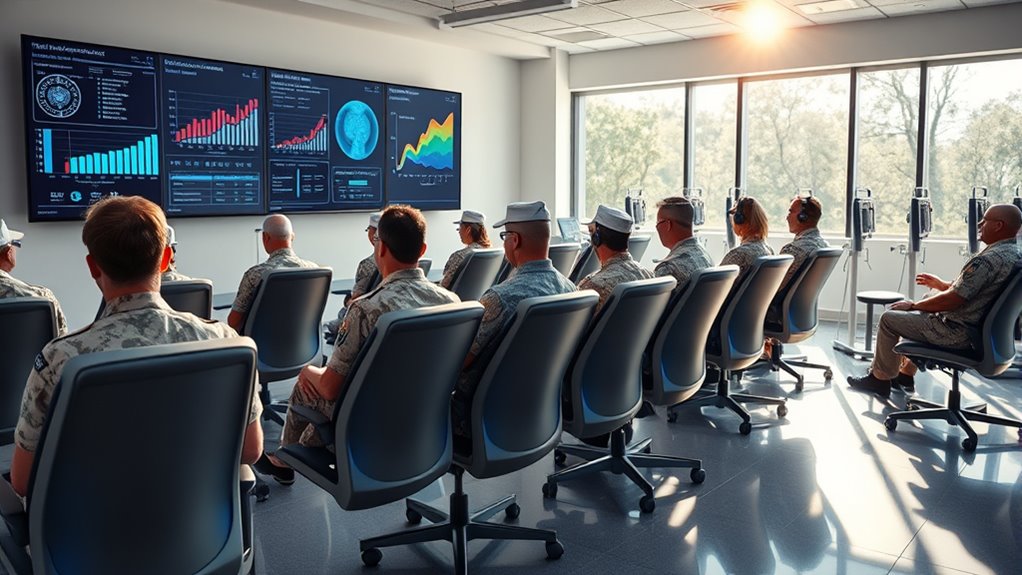By 2025, veterans’ hearing health is improving through advanced diagnostics like genetic screening and AI-driven assessments, leading to earlier and more accurate care. Innovative hearing devices with better noise reduction and customization are becoming more discreet and user-friendly. VA services are expanding via telehealth and improved insurance coverage, while efforts to reduce stigma are fostering openness. Ongoing policies and collaborations aim to create equitable access, addressing challenges in rural areas. Staying informed will reveal how these efforts are shaping future hearing care.
Key Takeaways
- Advances in diagnostics and personalized treatments are enabling earlier and more accurate detection of hearing loss among veterans.
- Innovative hearing aids with noise reduction, customization, and discreet designs improve user experience and long-term adoption.
- Expansion of VA telehealth services and community outreach efforts are increasing access to hearing care for veterans nationwide.
- Education campaigns and peer support initiatives are reducing stigma and encouraging early intervention among veterans.
- Policy and funding improvements are prioritizing innovative technologies and expanding hearing health programs for veterans.
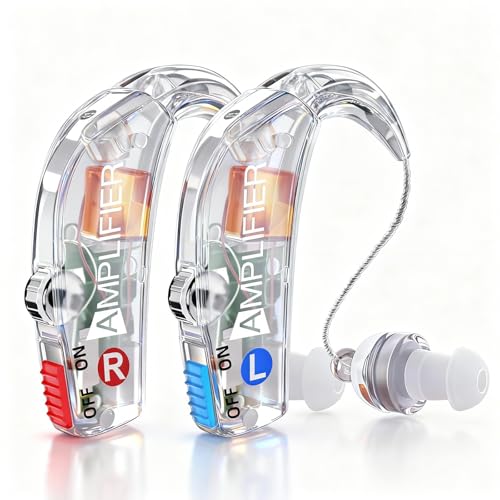
Hearing Aids for Seniors,Advanced Noise Reduction Function Hearing Aid Equipped With and AI Chips,Comfortable Portable Suitable Hearing Aid People With Hearing Loss,Fast Charging+Ultra Long Standby
👨⚕️𝙇𝙞𝙨𝙩𝙚𝙣𝙞𝙣𝙜 𝙩𝙤 𝙏𝙝𝙚 𝙎𝙤𝙪𝙣𝙙𝙨 𝙤𝙛 𝙏𝙝𝙚 𝙒𝙤𝙧𝙡𝙙: The WINTER PLUM hearing aid is equipped with a dedicated noise…
As an affiliate, we earn on qualifying purchases.
As an affiliate, we earn on qualifying purchases.
Advances in Diagnostic Technologies for Veterans
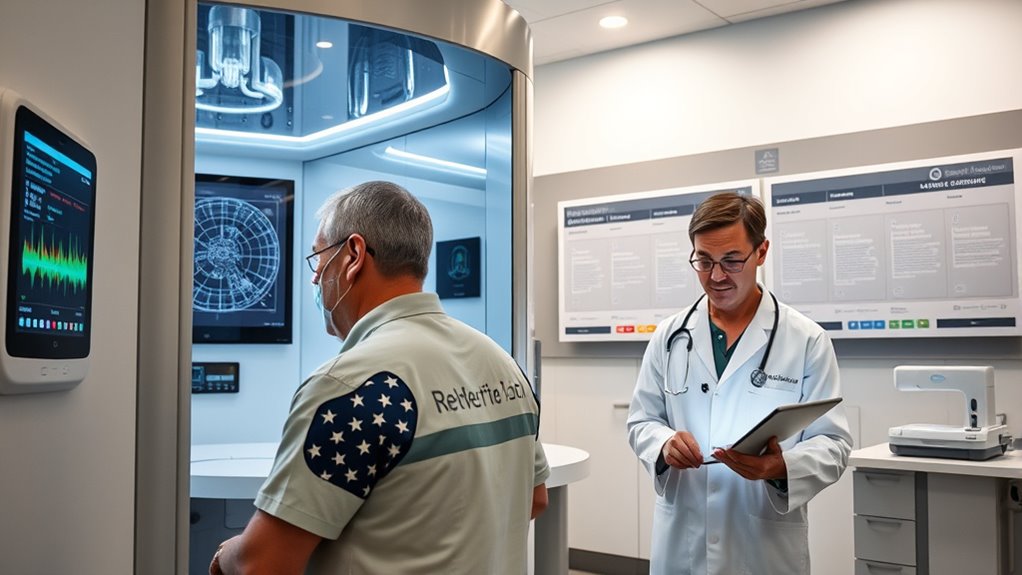
Recent breakthroughs in diagnostic technologies are transforming how we identify hearing issues in veterans. One key advancement is genetic screening, which allows for early detection of genetic predispositions to hearing loss. By analyzing DNA, healthcare providers can identify risks before symptoms appear, enabling proactive intervention. This technology helps distinguish between different causes of hearing impairment, leading to more holistic treatment plans. Early detection through genetic screening means you can access targeted therapies sooner, potentially preventing further deterioration. These innovations reduce reliance on traditional hearing tests alone, offering a more all-encompassing understanding of your hearing health. Additionally, improvements in diagnostic accuracy ensure that hearing issues are identified with greater precision, leading to more effective treatments. Enhanced screening methods also contribute to earlier diagnosis, which is crucial for effective management. Incorporating advanced imaging techniques further enhances the ability to pinpoint specific issues within the auditory system. As a result, veterans now have better tools to catch issues early, improving outcomes and quality of life through timely diagnosis and tailored care. Furthermore, integrating innovative technologies can help monitor hearing health over time, allowing for ongoing assessment and personalized care adjustments. These advancements are also supported by specialized testing protocols, which provide comprehensive evaluations tailored to individual needs.

Universal Hearing Screener
Universal hearing screener for auditory testing
As an affiliate, we earn on qualifying purchases.
As an affiliate, we earn on qualifying purchases.
Enhancements in Hearing Aid and Assistive Device Innovation

You’ll notice that hearing aids are becoming more effective with advanced noise reduction, helping you focus in noisy environments. Customizable sound profiles let you tailor your hearing experience to your specific needs, enhancing clarity and comfort. Plus, miniaturization and improved comfort mean devices are less intrusive and easier to wear all day long. Embracing industry trends in design processes can lead to innovative solutions that further improve user experience. Additionally, ongoing research into fathers’ impact on character development informs the creation of more intuitive and user-friendly technology, ensuring that devices meet the diverse needs of users. Furthermore, understanding state-specific tax laws can help optimize financial planning for those investing in hearing health solutions. The integration of microprocessor technology also allows for smarter, more adaptive devices that respond dynamically to different environments.
Advanced Noise Reduction
Have you ever wondered how advancements in noise reduction are transforming hearing aids and assistive devices for veterans? Today’s noise canceling innovations go beyond simple amplification, actively filtering out background noise to enhance clarity. These systems leverage sophisticated soundscape design, allowing devices to distinguish between important sounds and distractions. As a result, veterans experience improved focus during conversations and in noisy environments, reducing fatigue and frustration. Modern technology also adapts dynamically, adjusting noise reduction levels in real-time based on your surroundings. This continuous refinement guarantees a more natural listening experience. Utilizing filter replacement techniques ensures that devices maintain optimal performance and longevity. Furthermore, ongoing improvements in sound processing algorithms contribute to more precise noise suppression, making devices increasingly effective. By integrating advanced noise reduction features, hearing devices become more effective and comfortable, empowering veterans to engage confidently in everyday situations without being overwhelmed by overwhelming noise.
Customizable Sound Profiles
| Enhanced customization | Allows for personalized sound preferences to meet individual hearing needs. Advances in adaptive adjustments enable devices to better respond to diverse listening environments, providing a more natural listening experience. |
|---|---|
| Strategy | Description |
| Community Outreach | Engages local veterans through events and info sessions |
| Media Campaigns | Uses social media, TV, and radio to reach broader audiences |
Implementing hearing protection habits and increasing awareness can significantly improve veterans’ hearing health outcomes. These efforts create a supportive environment, empowering veterans to prioritize their hearing health.
Empowering Veteran Voices
Empowering veterans to share their stories is essential for breaking down the stigma surrounding hearing health. When you speak openly about your experiences, you help others realize they’re not alone, fostering a supportive environment. Peer mentorship programs connect veterans, offering encouragement and practical advice, making hearing health conversations less intimidating. Community outreach initiatives raise awareness, dispelling myths and emphasizing the importance of early intervention. Consider these ways to elevate veteran voices:
- Share personal stories to inspire others to seek help.
- Mentor peers to create a culture of openness.
- Participate in outreach events to educate your community.
- Use your voice to challenge misconceptions and promote hearing health awareness.
Your stories matter—by speaking up, you can change perceptions and empower others to prioritize their hearing health.

Audien Atom One OTC Hearing Aids – Wireless, Rechargeable, and Comfortable | Clear Sound in a Small, Discreet Design for Seniors & Adults with Hearing Loss
Hear What Matters Most: Hearing isn’t one-size-fits-all. That’s why our adjustable frequency system lets you personalize your sound…
As an affiliate, we earn on qualifying purchases.
As an affiliate, we earn on qualifying purchases.
Personalized Care Approaches and Tailored Treatment Plans

As hearing loss among veterans becomes more understood, personalized care approaches and tailored treatment plans are increasingly essential. You can now consider genetic factors that influence how hearing loss develops and responds to treatment, allowing for more precise interventions. Recognizing psychological impacts is equally crucial, as hearing loss can affect mental health and social well-being. By customizing strategies based on your unique genetic makeup and psychological profile, healthcare providers can recommend effective hearing aids, therapy, or assistive devices that suit your specific needs. This personalized approach improves outcomes, boosts confidence, and helps you regain communication skills more efficiently. Additionally, understanding home furnishings safety and comfort considerations can support the overall well-being of veterans managing hearing health, especially in creating safe and supportive living environments. Incorporating personalized care strategies, including tailored technology and support systems, further enhances the effectiveness of treatment plans. Considering ergonomic home decor can also facilitate easier access and reduce hazards for veterans with hearing impairments. Ultimately, tailoring treatment plans empowers you to manage hearing loss proactively, ensuring better quality of life and sustained engagement in daily activities.

Audien Atom One OTC Hearing Aids – Wireless, Rechargeable, and Comfortable | Clear Sound in a Small, Discreet Design for Seniors & Adults with Hearing Loss
Hear What Matters Most: Hearing isn’t one-size-fits-all. That’s why our adjustable frequency system lets you personalize your sound…
As an affiliate, we earn on qualifying purchases.
As an affiliate, we earn on qualifying purchases.
Policy Developments and Funding Initiatives Supporting Veterans

Recent policy developments and increased funding initiatives are substantially enhancing support for veterans’ hearing health. These policy reforms aim to improve access, quality, and affordability of care. Funding strategies now prioritize innovative technologies and expand hearing aid programs, making essential services more accessible. You’ll see progress through:
- Enhanced federal budgets dedicated to veteran hearing health programs
- Legislation streamlining access to hearing aids and diagnostics
- Public-private partnerships fueling technological innovation
- Increased grants supporting research and community outreach
These efforts evoke hope and demonstrate a commitment to honoring veterans’ sacrifices. As policies evolve and funding grows, your access to all-encompassing hearing care improves, ensuring no veteran is left behind. This momentum reflects a shared dedication to safeguarding hearing health for those who served.
Challenges in Rural and Underserved Areas
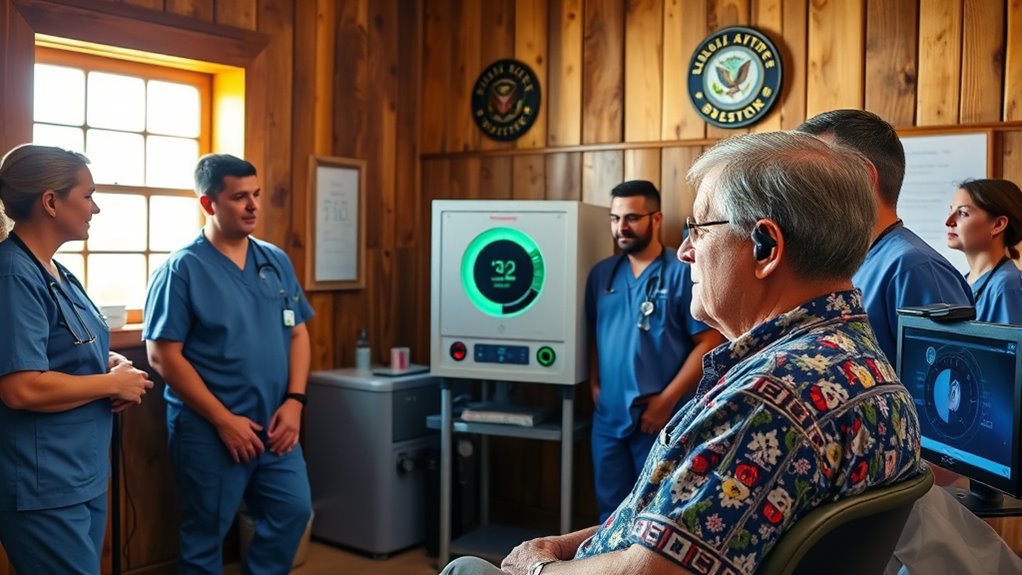
Despite the progress made through new policies and increased funding, veterans living in rural and underserved areas still face significant obstacles in accessing hearing healthcare. Limited local providers and a shortage of specialists mean many must travel long distances or wait months for appointments. Telehealth outreach offers some relief, allowing remote assessments and consultations, but it isn’t a complete solution. The lack of in-person services hampers early diagnosis and timely intervention. Additionally, poor internet connectivity in remote areas further restricts telehealth’s reach. Addressing these challenges requires expanding mobile clinics and incentivizing specialists to serve rural communities.
| Issue | Impact | Solution |
|---|---|---|
| Specialist shortages | Longer wait times, poor access | Incentives, telehealth |
| Limited local providers | Travel burdens, delays | Mobile clinics, training |
| Connectivity issues | Reduced telehealth effectiveness | Infrastructure improvements |
| Transportation barriers | Missed or postponed appointments | Community transport programs |
Collaboration Between Military and Civilian Hearing Health Sectors

Collaborating effectively between military and civilian hearing health sectors is essential to improving access and quality of care for veterans. When interagency coordination is strong, veterans experience smoother transitions and quicker treatment. Your voice matters—listening to veteran feedback helps tailor services to real needs, fostering trust and better outcomes. Key initiatives include:
- Building shared databases for seamless information exchange
- Coordinating specialized training to ensure consistent care standards
- Establishing joint outreach programs to reach underserved populations
- Incorporating veteran feedback into policy adjustments and service improvements
Future Directions and Emerging Technologies in Hearing Care
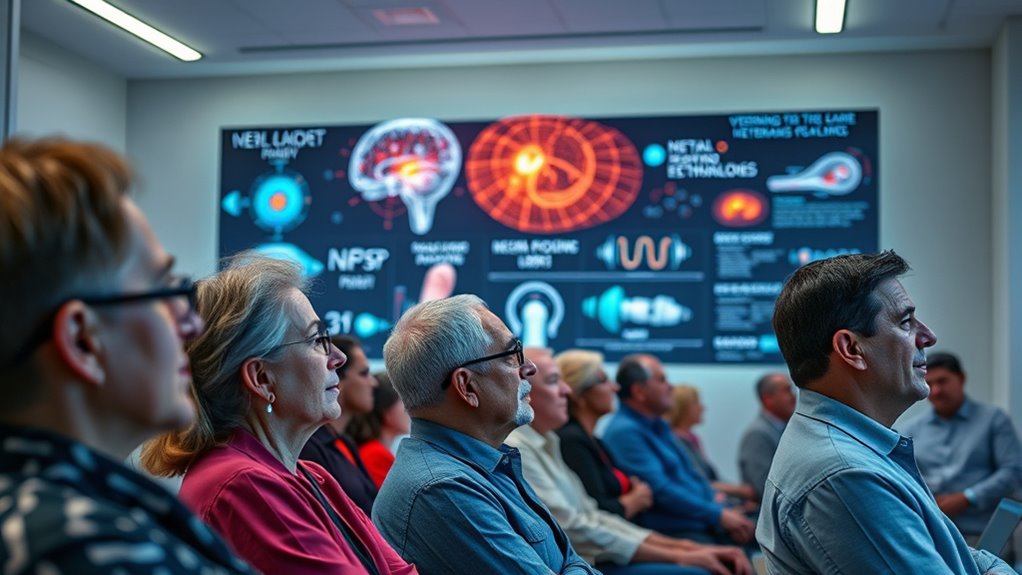
Emerging technologies are poised to revolutionize hearing care for veterans, offering more precise diagnostics, personalized treatments, and improved accessibility. Blockchain integration enhances data security and streamlines information sharing across providers, ensuring seamless continuity of care. AI-driven diagnostics enable rapid, accurate assessments of hearing health, identifying issues earlier and tailoring interventions more effectively. These innovations facilitate remote monitoring and telehealth services, making specialized care more accessible to veterans regardless of location. As these technologies evolve, they support proactive management of hearing loss, reduce diagnostic delays, and improve treatment outcomes. Staying at the forefront of these advancements will help guarantee veterans receive the most effective, personalized, and secure hearing care possible in the years ahead.
Frequently Asked Questions
How Will Emerging AI Technologies Impact Veterans’ Hearing Diagnostics?
AI diagnostics and hearing algorithms will revolutionize how you get your hearing tested. You’ll benefit from more precise, faster assessments that adapt to your specific needs. These emerging technologies can identify issues early and tailor treatments effectively, making the process less invasive and more accurate. As a veteran, you’ll experience improved hearing care through smarter diagnostics, ensuring you get the support you deserve with cutting-edge AI tools.
What Are the Upcoming Policies to Improve Hearing Aid Affordability?
You might find it interesting that upcoming policies aim to make hearing aids more affordable through new policy reform and funding initiatives. These efforts could reduce costs, making hearing health care accessible to more veterans. Coincidentally, increased funding supports research and innovation, which improves device quality. As a result, you could see better hearing solutions at lower prices, ensuring veterans get the care they deserve without financial barriers.
How Does Telehealth Enhance Hearing Care Access for Rural Veterans?
You can benefit from telehealth by accessing remote consultations, which let you receive hearing care without traveling long distances. Mobile clinics bring services directly to rural areas, making it easier for you to get evaluated and fitted with hearing aids. These initiatives reduce barriers, saving you time and effort, and guarantee you stay connected with specialists, ultimately improving your hearing health and quality of life in remote locations.
What Mental Health Support Is Integrated With Hearing Health Services?
You’re offered all-encompassing mental health integration with hearing services, ensuring emotional support, counseling, and stress management are seamlessly connected. This approach helps you address emotional challenges alongside hearing issues, promoting overall well-being. By combining mental health support with hearing care, veterans like you receive holistic treatment, reducing stigma, improving communication, and fostering resilience. This integrated model recognizes that hearing health and mental health are interconnected, supporting your recovery and quality of life.
How Will Future Innovations Address Age-Related Hearing Decline?
You’ll see future innovations targeting age-related hearing decline by focusing on advanced hearing loss prevention techniques and early detection. Technologies like smart hearing aids and predictive diagnostics will help you manage age-related hearing issues more effectively. Researchers are developing preventive strategies, including protective devices and lifestyle recommendations, to preserve your hearing health longer. These advancements aim to reduce the impact of age-related hearing loss, helping you stay connected and engaged as you age.
Conclusion
By 2025, your journey through hearing health will be like steering a clearer, more vibrant landscape—where advanced tech acts as your guiding compass and personalized care paints a brighter, more inclusive horizon. Despite hurdles in rural areas, ongoing collaborations and innovations promise a future where every veteran can hear life’s symphony fully. Together, you’re shaping a world where silence gives way to sound, and every voice can be heard loud and clear.

